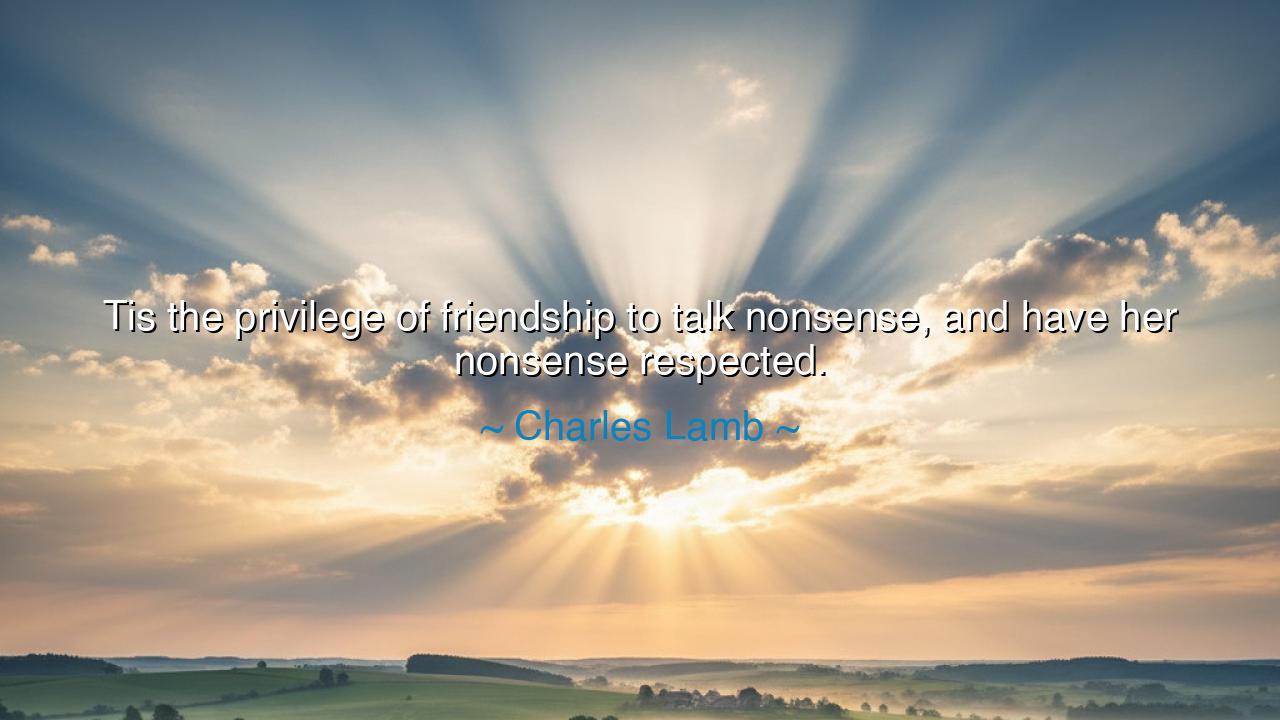
Tis the privilege of friendship to talk nonsense, and have her






“’Tis the privilege of friendship to talk nonsense, and have her nonsense respected.” Thus wrote Charles Lamb, that gentle soul of English letters, whose humor was tender and whose heart was wide. In these words, wrapped in the simplicity of jest, lies a truth profound: that friendship is not built only upon wisdom, gravity, or reason, but upon the freedom to be foolish without fear. To speak nonsense, and still be loved — that is the mark of a bond that transcends pretense. For in friendship, as in the quiet harmony between kindred spirits, the soul may lay down its armor and be seen as it truly is — imperfect, spontaneous, human.
In the ancient world, men spoke often of friendship as the noblest of virtues — Aristotle called it the “necessity of life,” and Cicero named it the “sun of the soul.” Yet Lamb, in his wisdom, reminds us that even among such lofty ideals, the heart yearns for laughter and imperfection. True friendship is not a council of philosophers, but a gathering of equals who delight in each other’s being. It is the space where the mind may wander into nonsense, and the heart need not apologize. For friendship, like love, is not sustained by brilliance, but by acceptance — that gentle grace which allows one to be foolish without being forsaken.
In the drawing rooms of London, where Charles Lamb and his sister Mary Lamb hosted poets and thinkers — Coleridge, Wordsworth, Hazlitt — there flowed not only ideas but laughter, wit, and play. Amid the smoke of pipes and the scent of ink, they spoke of philosophy one moment and whimsy the next. Their fellowship was a living example of Lamb’s words — that even the greatest minds, when among friends, could talk nonsense and find it cherished, not mocked. It was this intimacy, this unspoken permission to err, to jest, to dream aloud, that gave their friendship its warmth and its immortality.
To talk nonsense is, in truth, a sacred act — not of ignorance, but of trust. It is the soul’s way of resting. When one is among strangers, words are measured and guarded, but among true friends, words flow like water from a clear spring — unfiltered, pure, and unashamed. The friend who listens to your nonsense and still smiles, who sees your absurdities and still honors your worth — that friend has touched the essence of loyalty. Such moments are not trivial; they are the quiet foundations of love.
Consider the story of Socrates and his companions. Though history remembers their dialogues for wisdom, those who knew them spoke of their laughter, their teasing, their simple joys. Socrates himself was known to jest even in the shadow of death, showing that philosophy and play are not opposites, but companions. For what is friendship, if not the union of seriousness and mirth, of truth and folly, held together by mutual respect? The laughter shared between friends is no mere noise — it is the sound of trust, the echo of hearts unguarded.
Charles Lamb, who endured sorrow and hardship, understood that friendship is the sanctuary where the weary may lay down their burdens. His life was not free of tragedy — yet through all, he found solace in human connection, in the laughter that healed what grief could not. To talk nonsense was, for him, not a retreat from meaning, but a return to life’s simplicity. He teaches us that not every word must be wise to be worthy, and not every moment must be solemn to be sacred.
So, my child, learn this truth: in friendship, the measure of depth is not only in counsel but in comfort. Be the friend who listens with patience, who does not scorn the small or the silly. Allow others to stumble in words, to laugh at trifles, to dream aloud without shame. For in honoring the “nonsense” of those you love, you affirm their very humanity. To mock the lightness of a friend is to wound the bond itself; to cherish it is to strengthen it forever.
And thus, let Lamb’s wisdom be remembered through the ages: that the privilege of friendship lies not only in shared wisdom, but in shared foolishness. Let your friendships be wide enough to hold laughter, and strong enough to survive honesty. Speak truth when needed, and nonsense when possible — for both are holy in their time. For it is not the perfect friend who endures, but the one who loves you through your nonsense, and still calls you their own.






AAdministratorAdministrator
Welcome, honored guests. Please leave a comment, we will respond soon